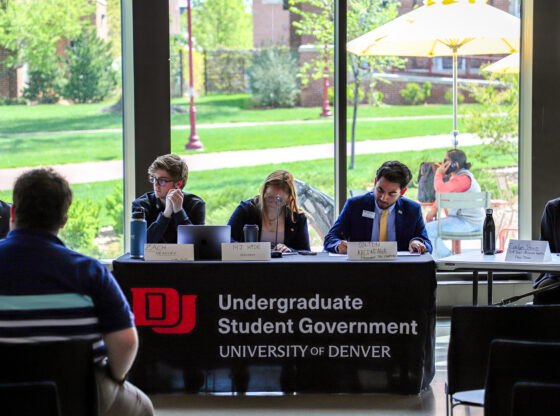Governor. John Hickenlooper called for allowing civil unions between committed couples and providing more scholarships to Colorado students during the annual State of the State last Thursday, a broad policy-oriented speech about the future of Colorado and the policies he would like to see passed at the state legislator.
With a little over 175 legislators, lobbyists and constituents packed into the small legislator, Hickenlooper urged lawmakers to faithfully work with each other on a broad set of issues including education, government-efficiency and civil unions.
Civil unions in the 2012 legislative session seems expected to pass with many republican lobbyists, prominent donators and interest groups coming out in favor of it. Last session, civil unions died in the Judiciary committee on a party line vote of 6-5, with all republicans voting against the measure and all democrats voting in favor of it. Speaker Frank McNulty, a republican, will guide the bill to a specific committee, a choice that will effectively pass or deny civil unions. If he were to send the bill to a committee with even just one republican civil union supporter, the bill would go to the house floor and most likely pass.
Hickenlooper said he is also seeking a bill to sell Colorado’s worker’s compensation insurance company, Pinnacol Assurance, to provide scholarships to Colorado students. Under the proposed bill, Colorado would still continue to own 40 percent of Pinnacol but also receive nearly $14 million annually to fund scholarships and economic development issues.
“The link between higher education and economic development is very clear,” said Hickenlooper. “They go hand-in-glove. So, if we agree on a new future for Pinnacol, we hope you will also agree that funding for scholarships makes sense.”
The governor also spoke about the Lobato v. Colorado, a suit brought by an interest group and DU student Taylor Lobato against the state of Colorado for not having a “thorough and uniform” education system. The lower court agreed with Taylor Lobato, ruling that Colorado’s education system is underfunded by billions of dollars.
If the district court’s decision is upheld by Colorado’s Supreme Court, the state legislator will have to spend more for education of the total $7 billion budget, in which already $3 billion is tasked to education and the rest is going to Medicaid, police services and government agencies.
“For example, in the Lobato case, a district court judge has ruled that the state is deficient in meeting school funding requirements under the state Constitution,” said Hickenlooper, who has cut over a quarter of a billion dollars from education since his tenure. “We will appeal the decision to secure a final resolution of the constitutional issues raised in the case, but the question of finding additional revenue for education is one of our greatest budget pressures.”
The governor’s speech earned him praise from conservative representatives.
“This guy’s a Republican, well, except for the part about civil unions,” said the Republican Majority Caucus Leader Carole Murray to the Denver Post.
The call for bi-partisanship by the governor is largely expected by government insiders to fall to deaf ears. Colorado’s redistricting process was not in the least bit cordial and has left republicans with a sour taste and a likelihood of losing control of the House.
The redistricting plan, which Denver District Judge Robert Hyatt ruled in favor of early last November, redrew the congressional district, state Senate and state House lines to fit the changing state populations and include a larger number of voters.
The changes may shift votes significantly.
“All this creates, in many ways, a great new opportunity for observers, voters and volunteers,” said political science professor Seth Masket. “It seems there’s quite a bit of uncertainty about what exactly this means for the next election.”
DU is situated in Colorado House District 2 and Congressional District 1.
Some students who live off-campus were shifted into adjacent precincts and no longer vote with students who live on-campus. The new map changes where voters go to caucus and who their representative to a party’s conventions is.
The changes give DU students more opportunities to volunteer or work for the campaigns of four candidates without having to travel more than 15 miles from campus.
The new lines include more voters and a larger geographic area in each precinct.
The new districts also pit some local Republican incumbents against one another because it makes competition more likely in Colorado’s 3rd, 6th and 7th Congressional districts.
In contrast, “[the Democratic map] most accurately reflected and preserved current communities of interest,” said Hyatt.
Governor Hickenlooper said the need for bi-partisanship is extremely important and the increased competition due to redistricting might compel both parties to seek moderate voters and thus might force them to work together.
Alex Johnson also contributed information to this story.










